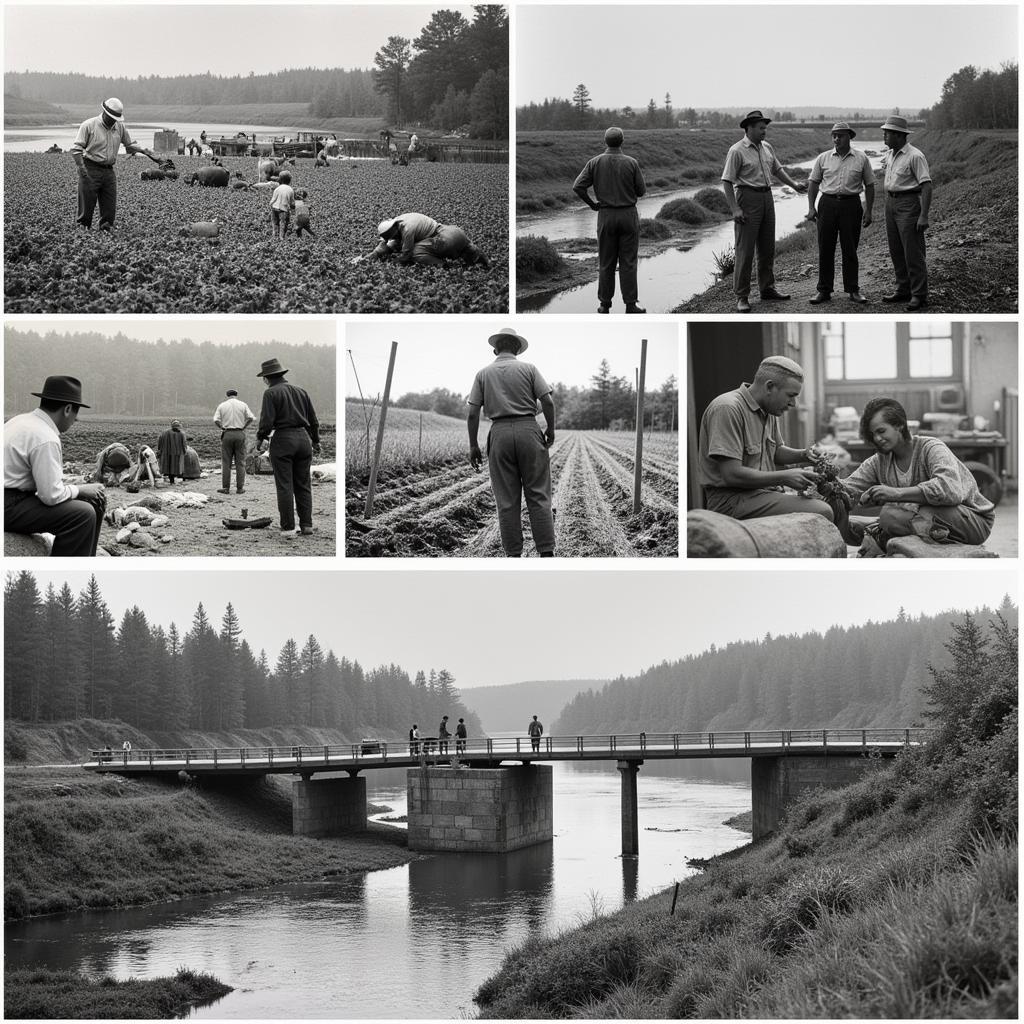The New Deal And Great Society, two landmark eras in American history, offer poignant reminders of the power of collective action to address societal challenges and forge a path towards a more equitable future. While separated by time, these initiatives resonate deeply with the core values of the Society for Peace: fostering understanding, promoting empathy, and inspiring positive action for a more just and peaceful world.
A Nation in Crisis: The Genesis of the New Deal
 New Deal Programs: Images of construction workers, farmers receiving aid, and public works projects
New Deal Programs: Images of construction workers, farmers receiving aid, and public works projects
The 1930s witnessed the United States gripped by the Great Depression, a period of unprecedented economic hardship. Unemployment soared, poverty became widespread, and a sense of despair permeated the nation. In response to this crisis, President Franklin Delano Roosevelt launched the New Deal, a series of programs and reforms aimed at providing relief, recovery, and reform.
The New Deal recognized the interconnectedness of society, understanding that government intervention was necessary to protect the vulnerable and stimulate economic growth. From infrastructure projects like the Tennessee Valley Authority, which brought electricity to rural areas, to social safety net programs like Social Security, the New Deal sought to uplift the lives of millions of Americans.
A Vision for a More Just Society: The Legacy of the Great Society
Building upon the foundation laid by the New Deal, the Great Society, spearheaded by President Lyndon B. Johnson in the 1960s, aimed to address persistent poverty and inequality. Driven by a profound belief in equal opportunity and social justice, the Great Society encompassed a wide array of programs focused on education, healthcare, civil rights, and poverty alleviation.
Landmark legislation like the Civil Rights Act of 1964 and the Voting Rights Act of 1965 dismantled legal barriers to equality and empowered marginalized communities. The establishment of Medicare and Medicaid expanded access to healthcare for millions of elderly and low-income Americans.
Echoes of Hope: Lessons for a Divided World
The New Deal and Great Society, while not without their limitations, serve as enduring testaments to the power of collective action to overcome adversity and build a more just and equitable society. They remind us that even in the face of daunting challenges, hope can emerge from shared purpose and a commitment to the common good.
In an increasingly interconnected world grappling with complex issues like climate change, economic inequality, and social polarization, the lessons of the New Deal and Great Society resonate deeply. They call upon us to embrace empathy, engage in constructive dialogue, and work together to create a world where everyone has the opportunity to thrive.
The Society For Peace believes that by understanding the struggles and triumphs of the past, we can draw inspiration and guidance for building a more peaceful and just future. The echoes of hope from these transformative eras remind us that together, we can make a difference.
FAQs about the New Deal and Great Society
1. What were the main goals of the New Deal?
The New Deal aimed to provide relief, recovery, and reform in response to the Great Depression. It sought to alleviate immediate suffering, stimulate economic growth, and implement long-term structural changes to prevent future economic crises.
2. What were some of the key programs of the Great Society?
The Great Society encompassed numerous programs, including Medicare, Medicaid, the Civil Rights Act of 1964, the Voting Rights Act of 1965, and the establishment of Head Start and other educational initiatives.
3. How did the New Deal and Great Society impact American society?
These eras brought about significant social, economic, and political changes, expanding the role of government, strengthening the social safety net, and advancing civil rights.
4. What lessons can we learn from the New Deal and Great Society today?
These eras highlight the importance of collective action, government intervention in times of crisis, and a commitment to social justice in addressing societal challenges.
5. How can we apply the lessons of the New Deal and Great Society to contemporary issues?
By embracing empathy, engaging in dialogue, and working collaboratively, we can address issues like climate change, inequality, and social division in a spirit of shared responsibility.
For further insights into the dynamics of societal change, you can explore these related articles:
- In conflict and order understanding society
- Explain the role of entrepreneurship in society
- Sustainable Society
Need Support?
Contact us 24/7:
Phone: 02043854663
Email: [email protected]
Address: Khu 34, Bắc Giang, 260000, Vietnam.